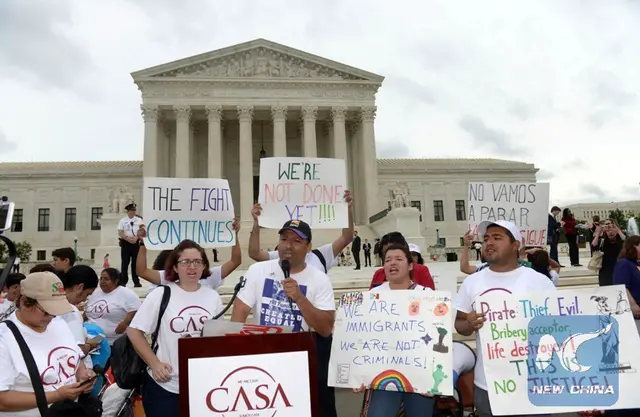U.S. Supreme Court on Thursday delivered a heavy blow to the White House's immigration program by remaining in place a lower court's ruling that blocked the program.
By voting 4-4, the Supreme Court on Thursday left in place a previous ruling by the 5th U.S. Circuit Court of Appeal against U. S. President Barack Obama's controversial immigration executive action in 2014.
Speaking at the White House, Obama called the Supreme Court's deadlocked decision "frustration to those who seek to grow our economy and bring a rationality to our immigration system."
"The fact that the Supreme Court wasn't able to issue a decision today doesn't just set the system back further," said Obama. "It takes us further from the country that we aspire to be. "
Meanwhile, presumptive Democratic presidential nominee Hillary Clinton called the deadlocked decision "unacceptable" and took a sharp jab at her rival in the general election Republican Donald Trump.
"This decision is also a stark reminder of the harm Donald Trump would do to our families, our communities, and our country," said Clinton in a statement.
Trump had proclaimed from the very beginning of his candidacy that he would implement tougher immigration policies, pledging to deport millions of illegal immigrants and to build a wall along U. S.-Mexico border.
In 2014, Obama resorted to his executive authority to circumvent Congress and pushed forward immigration reforms by seeking to provide as many as 5 million illegal immigrants with work permit while shielding the majority of them from deportation.
This immediately sparked an outcry among Republicans, calling the action an illegal executive overreach.
In its defense, the White House previously said the Supreme Court and Congress had made clear that "the federal government can set priorities in enforcing our immigration laws."
The first phase of Obama's executive action on immigration reform was supposed to start taking effect in February last year.
As a result, young immigrants would be protected from deportation if they were brought to the U.S. soil illegally as children. The second phase would extend immunity to deportation to parents of U.S. citizens and permanent residents.
However, the new deportation-relief program never kicked off after U.S. District Judge Andrew Hanen in Texas issued a court injunction against the program on the eve of its launch.
(APD)
 简体中文
简体中文

